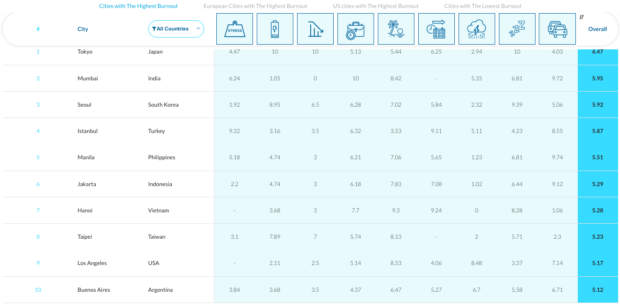Manila ranks 5th among world cities with highest burnout rate — think tank
MANILA, Philippines — The City of Manila has made it to the Top 10 of cities in 53 countries with the highest risk of employees experiencing burnout, according to a research compiled by a think tank run by writers and sleep experts.
SavvySleeper claimed to have “reviewed data from 7 reputable sources, including the International Labour Organization, the Global Employee Engagement Index, and the Institute for Health Metrics and Evaluation, in addition to over 340,000 employee reviews on Glassdoor, to rank global cities by their burnout potential.”
A total of 69 cities from 53 countries were analyzed. The research found that Asian cities dominate the top 10 cities with the highest risk of burnout.
In its research sent to media on Friday, the group ranked Manila as fifth among chief cities with the highest risk of employee burnout, with an overall 5.51 burnout score.
Manila ranked behind Istanbul, Turkey; Seoul, South Korea; Mumbai, India; and topnotcher Tokyo in Japan.
Other cities in the top ten are Jakarta, Indonesia; Hanoi, Vietnam; Taipei, Taiwan; Los Angeles, United States; and, Buenos Aires, Argentina.
In its findings, SavvySleeper found that Manila garnered high scores for the following stress factors: amount of stressed employee review (5.18); annual work hours (6.21); vacation time (7.06); population working more than 48 hours (5.65); population sleeping less than 7 hours (6.81); and, time spent in traffic for work (9.74) — incidentally, the highest score for this category among all other countries surveyed.
Other factors measured in the study are employee presenteeism (employees being on the job but due to illness or other medical conditions are not fully functioning), lack of motivation at work, mental health disorder and substance abuse prevalence.
Citing information from the World Health Organization, SavvySleeper noted that burnout is a result of work stress that has not been managed and has the following signs: feelings of low energy and exhaustion, decreased motivation and increased distance from work as well as the feeling of cynicism towards a role and in wider society, and; reduced performance and results at work.
In May last year, WHO said burnout remains an “occupational phenomenon” that could lead someone to seek care and is not considered a medical condition as earlier reported.
“With increasing professional pressures, heavy workloads, and unclear expectations, employees often find themselves working later, socializing less and having impacted sleep,” said SavvySleeper.
“It can lead to a vicious cycle of stress. By socializing less, employees are less able to get support from friends and loved ones. And poor sleep leads to tiredness and poor performance at work – which in itself reduces an employee’s confidence in their abilities and motivation to work,” it added.
Likewise, SavvySleeper pointed out that the stress cycle can also take its toll on physical health, noting that heart disease, high blood pressure, and mental health issues are commonly found in those with severe burnout.
Meanwhile, the study also noted that all top ten cities with the least occupational burnout are located in Europe.
“Europe has often enjoyed a reputation for being more laid-back than its continental counterparts and this attitude is reflected in France’s recent law allowing employees to switch off from work emails when out of the office,” the study read.
The lowest scoring global city for work burnout is Tallinn, Estonia. SavvySleeper attributed this to the city offering a generous amount of vacation, with an average of 29.1 paid days off. Only 5.6 percent of the population also work more than 48 hours a week.
But while Asian cities and US cities are at higher risk, they appear to be doing more to tackle the causes of burnout, according to the research.
SavvySleeper noted that while the study looks at burnout at a city-level, it is up to employers to play their role in establishing a healthier workplace culture.
“They should encourage employees to get enough rest and achieve a strong work-life balance to ensure they’re happy at work. It’s in employers’ best interests to prevent burnout, too,” read the study.
SavvySleeper recommends sleep, exercise and socializing as some steps to prevent burnout.
